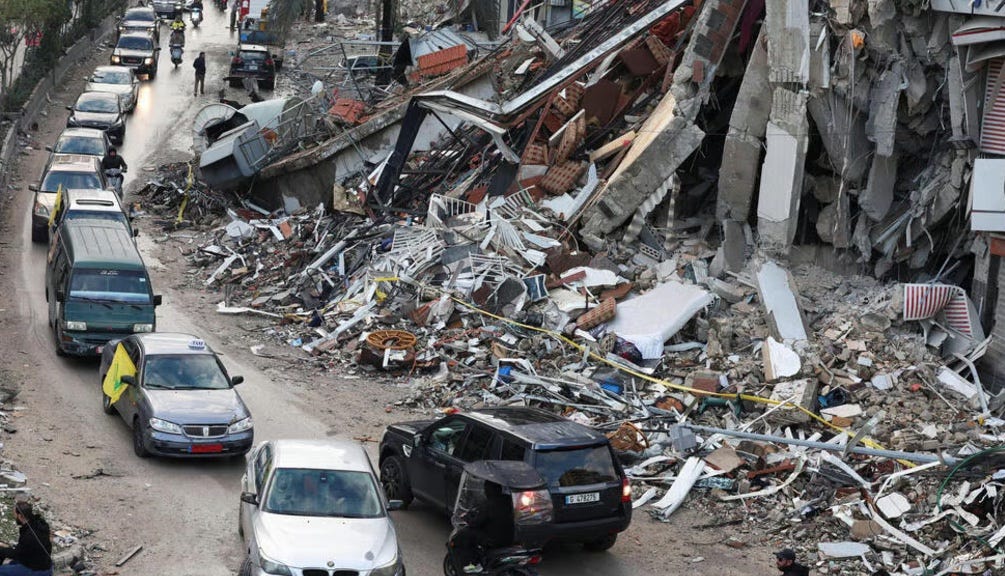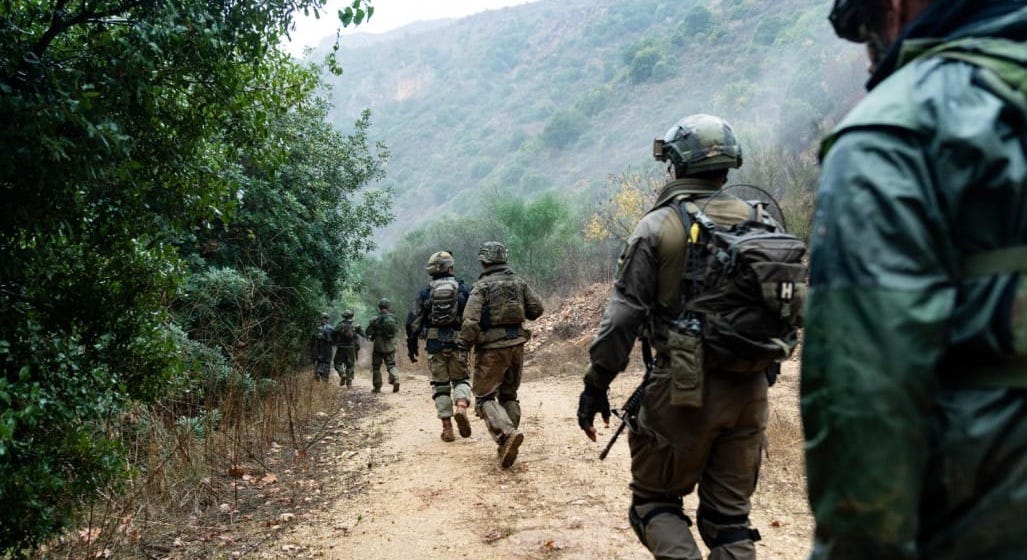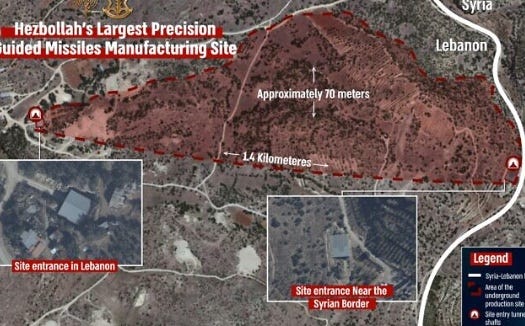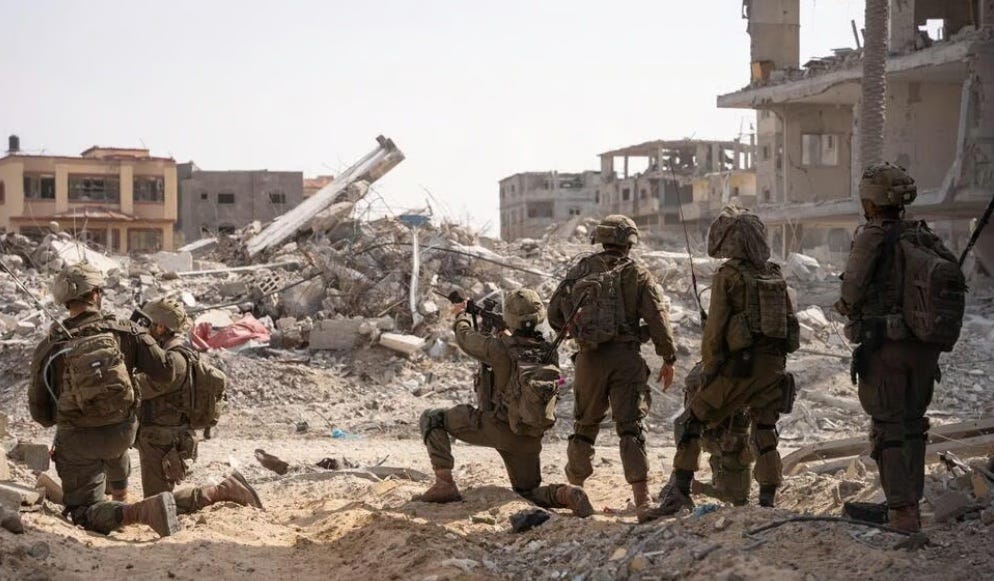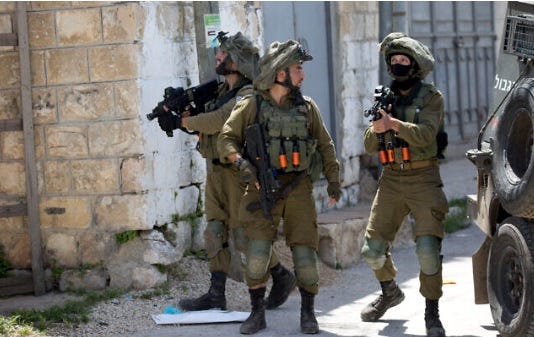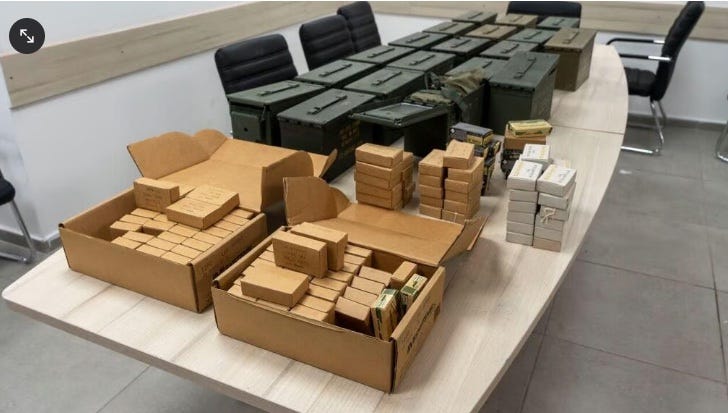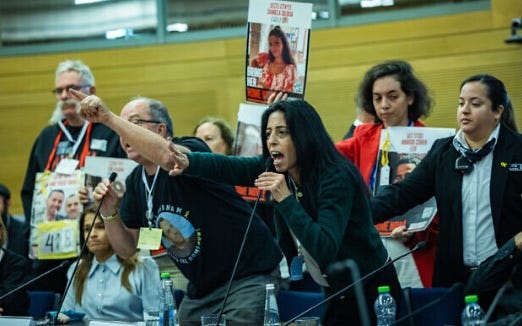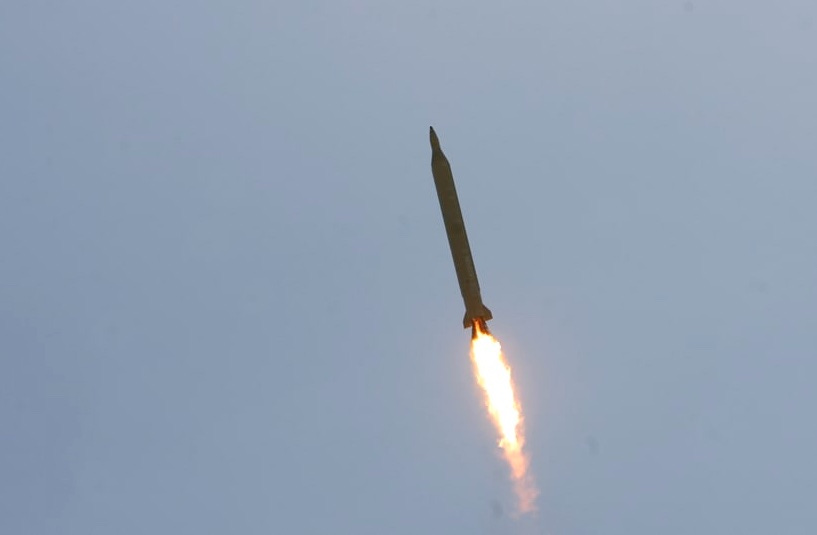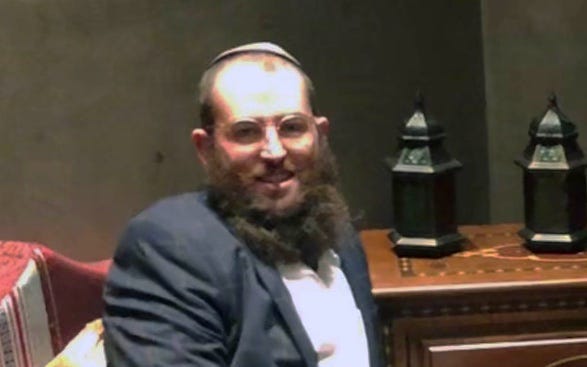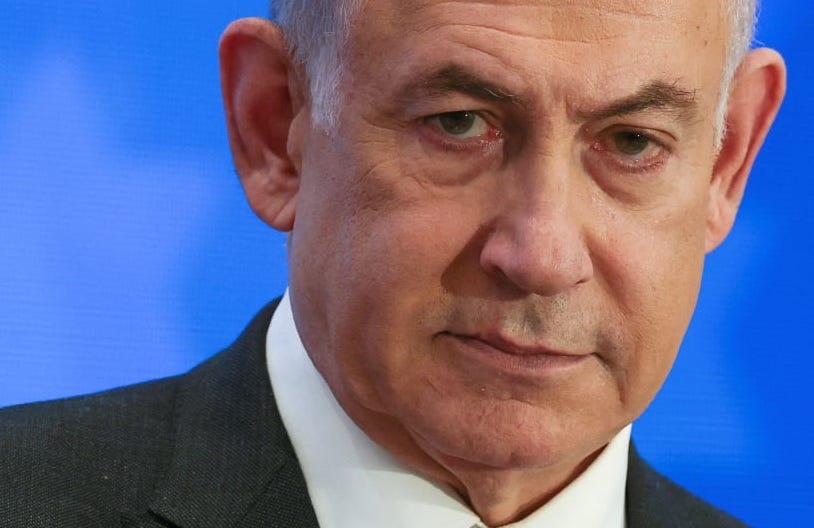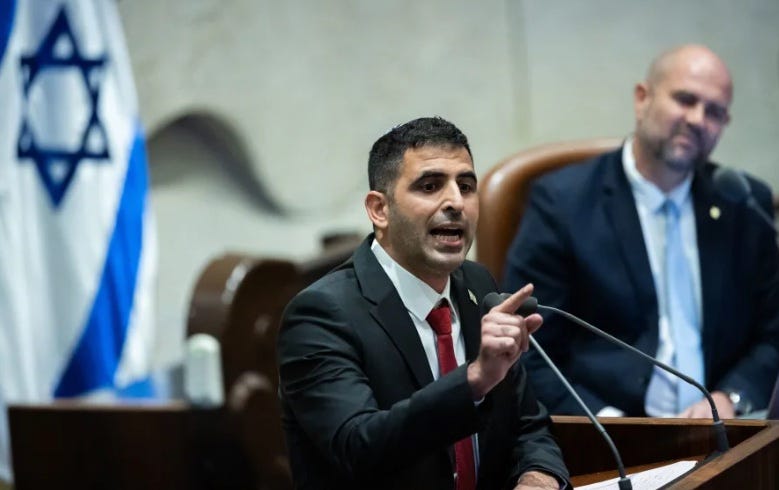War
Blue line marks the edge of south Lebanon. White line Israel’s border
At 04:00 on Tuesday Nov 27,2024, after 14 months of war, Israel reached a ceasefire agreement, approved by Iran, with the Hezbollah terrorist organization in Lebanon.
Israel invaded Lebanon on October 1st in order to prevent Hezbollah from executing a plan to swoop into Israel and take control of the Galilee, in above similar to the Hamas attack from Gaza when 3,000 Hamas terrorists massacred over 1200 Israelis and some foreign workers, and took 252 prisoner. 101 are still held hostage in Gaza.
Hezbollah had prepared the groundwork for a similar invasion, including an extensive tunnel network and pre-positioned weapons ready for the use of their estimated 30,00-40,000 troops.
In the past two months in south Lebanon the IDF stopped the Hezbollah plans to invade the Galilee. The IDF destroyed tunnels and weapons depots and displaced the Lebanese residents from along Israel’s border.
Israel also began an extensive air attack on the Hezbollah hierarchy, eliminating Hezbollah leader Nasrallah and most of his support staff. Israel also carried out an extensive bombing campaign in the Hezbollah controlled neighborhood of Dahieh, where Hezbollah leaders lived and where Hezbollah had their headquarters.
However, Hezbollah kept up the rocket fire that claimed the lives of Israelis and displaced nearly 60,000 residents from their homes in the north. While Israel claims that two-thirds of Hezbollah rockets and drones have been destroyed on Sunday Hezbollah launched a record 250 rockets at Israel.
France’s Macron, US’s Hochstein, Lebanese PM Makati
The ceasefire agreement, brokered by the US special envoy Amos Hochstein, France’s President Emmanuel Macron and Lebanese Prime Minister Najib Makati, does not call for the dissolution of Hezbollah. However, Israel does retain the right for a ‘freedom of action’ in enforcing the agreement should Hezbollah act against it.
The agreement details that Hezbollah must be kept beyond the Litani river, that is mostly beyond the range of most of Hezbollah’s short-range rockets. .
However, the Litani drifts closer to the Israeli border in some places, like Metulla, where it is only 4 kilometers from the border town.
Metulla is today mainly a ghost town, with the residents having relocated to the center of the country. Reportedly, there isn’t a home in the small village that hasn’t been hit, or destroyed, by Hezbollah rockets.
Already on Tuesday Hezbollah terrorists tried to return to the area in south Lebanon just four kilometers from the Israeli border town of Metulla. IDF forces in the area fired on these Hezbollah terrorists driving them out of the area. Four were captured by Israel and brought in for questioning.
News of the ceasefire was greeted with joy by most Lebanese. Cars began steaming from Beirut and the north back to southern Lebanon, a Shiite stronghold. (Hezbollah is a puppet of Iran, a Shiite controlled country.)
Cars in Lebanon heading south. Yellow Hezbollah flags visible.
The news of the ceasefire was greeted positively by US President Joe Biden who went on TV on Monday night and said, “"I have good news from the Middle East. I spoke with the Prime Ministers of Israel and Lebanon, they approved the cease-fire proposal between Israel and Hezbollah.”
"Let's be clear - if Hezbollah violates the deal, Israel will retain the right to defend itself. In the same way, Lebanon's sovereignty must be maintained and a new beginning allowed for it."
Reportedly, Biden believes that this ceasefire will lead to an opportunity to bring Israel and the moderate Arab states into some sort of alliance against Iran.
Israel’s Prime Minister Benjamin Netanyahu appeared on TV announcing the ceasefire claiming credit for the defeat of Hezbollah.
According to analyst Avi Isscarof, one of the creators of the Fauda TV series, writing in Ynetnews,”Hezbollah was beaten in the war, and can no longer deny it: it lost.
“This is a campaign that will be taught in military schools in every Western and Eastern country: how Israel managed – with the right combination of cunning, stratagem and accurate intelligence (along with the fighting spirit and sacrifice of its soldiers) – to win the campaign in Lebanon from the moment it made the decision to do so.
However, he also wrote “This raises many questions about the insistence of the State of Israel since 2006, under various governments – that of Olmert, Netanyahu of course, and Bennett-Lapid – to allow Hezbollah's disorderly buildup in the 17 years that have passed since then without taking action to stop it.
Although actions have been taken in Syria, the apprehension and fear of a confrontation with Hezbollah led to a dangerous paralysis, which led the State of Israel to the brink of a security disaster, which was exposed, among other things, by Sinwar's decision on October 7 to go to war.
Former Prime Minister Ehud Olmert backed the cease-fire and said that it could have been implemented much earlier. He said that any agreement that keeps Israeli soldiers from dying is a good agreement. Olmert said that so far 80 Israeli soldiers have been killed in the fighting in south Lebanon.
Among the terms of the agreement is that the IDF will withdraw from Lebanon within 60 days. The Lebanese army is supposed to take up positions in south Lebanon to prevent Hezbollah from again becoming entrenched in the border region.
There is also talk of an international force aiding the Lebanese army of 5,000 troops.
Israel has kept the right to overfly Lebanon to determine if the cease-fire conditions are being met. That Hezbollah doesn’t rearm, rebuild the destroyed attack tunnels, nor again begin production of weapons, rockets and drones.
Speaking to Channel12TV news on Wednesday night, US Special Envoy to the Middle East, Amos Hochstein, who brokered the deal between Israel and Hezbollah said that initially the goal, following the start of the war on Oct 7, 2023, was to contain the fighting so that it didn’t escalate and spread around the region.
It was only four months ago, said Hochstein, that he became involved in trying to bring about a ceasefire. One of the reasons the present ceasefire came to fruition was the fact that Hezbollah decided to back away from their promise to fight as long as the war continued in Gaza.
Once this linkage was broken, said Hochstein, progress for a ceasefire could be achieved. He also said that one of the incentives presented to the Israelis was that he could make a deal now but should Israel wait they’d have to face a new administration and new ideas and demands. And at the earliest, a ceasefire couldn’t go into effect until mid March.
Hochstein said that the present ceasefire agreement was much different from UN resolution 1701 that was drawn up in 2006. He said of that agreement, “Nothing was ever enforced, not by Lebanon and not by Israel.” He said that the present agreement puts in a mechanism where the US, with France, will receive the complaints from Israel, not UNIFIL. This allows the US and France to monitor the situation and dismantle any Hezbollah build up. This will not be a temporary effort but will take a look at a problem and deal with it.
As for those calling for an IDF controlled security zone in south Lebanon he said that there are many who dream of what could be but dreams are not what can be implemented. There is no reality in which Lebanon would agree to allow Israeli troops to remain in south Lebanon.
The present agreement, said Hochstein is aimed at making sure Hezbollah cannot return to south Lebanon, rearm, build rockets and drones. He said it was a fantasy for anyone to think more could be achieved at this time.
According to the terms of the agreement. the US made guarantees to Israel in order to reach agreement for a ceasefire.
A* Israel and the U.S. intend to share sensitive intelligence concerning violations, including any infiltration by Hezbollah into the Lebanese army.
B* The U.S. may share information provided by Israel with the Lebanese government or commission to allow them to address the violations.
C* The U.S. is committed to cooperating with Israel to curb Iran's destabilizing activities in Lebanon, including preventing the transfer of weapons, affiliates and others from Iranian territory.
D* The US recognizes Israel's right to respond to threats coming from Lebanese territory in accordance with international law.
E* In the southern region, Israel reserves the right to act at any time against violations of the commitments. Outside the southern region, Israel reserves the right to act against the development of threats directed against it, if Lebanon is unable or unwilling to thwart these threats. If Israel decides to take such steps, it will inform the U.S. of this wherever possible.
F* Israeli flights over Lebanon will be conducted for intelligence, surveillance and reconnaissance purposes only and will not break the sound barrier.
Gen (ret.) Amos Yadlin told Channel 12TV that this was a good agreement. He said that Hezbollah knows that they have lost this war. He said the agreement means that if Hezbollah not only fires rockets at Israel but even brings in weapons the IDF can act without permission. “If they even bring in a truck laden with missiles the IDF can act to destroy it.
“This is not the same agreement as 2006. It is very different,” said Yadlin. “And now we will get boats full of weapons for the IDF that were being held up. And were very important to us. And most of all we are not being told “don’t” but rather “go.”
Pundits agreed with Yadlin and assumed that one of the incentives for Israel to accept the agreement was announced on Wednesday. Ynetnews reports that Biden approves $680 million precision weapons deal with Israel.
The Financial Times on Wednesday reported that Prime Minister Benjamin Netanyahu cited the arms deal in a statement Tuesday as a key reason for supporting a de-escalation agreement with Hezbollah.
Meanwhile, Channel 12TV’s military correspondent Nir Dvori also reported that the IDF had destroyed a large sophisticated ballistic missile factory in the Baalbek. area. Also, used over 100 bombs to take out an underground ballistic missile factor. In that raid over 100 terrorists were also killed.
Dvori also said that the IDF was ready to go ack into souther Lebanon whenever necessary to make sure Hezbollah was abiding by the agreement.
Channel 12TV also reported that Israel had opened fire on Hezbollah terrorists who had approached their position in south Lebanon near the border with Metulla. The IDF announced that it would open fire at anyone approaching an IDF position. Channel 12TV also reported they’d captured taken four Hezbollah terrorists in for questioning.
Yaron Avraham, Diplomatic correspondent for Channel 12TV, said that what was important in the present agreement was that if Israel wants to do something outside of the agreement, Israel must notify the US. And that the US would then be able to back up Israel.
North
IDF troops near Litani River
Residents of the north of Israel objected strongly to the ceasefire agreement. Spokespersons from northern towns and cities said that the agreement does not provide security that Hezbollah won’t begin firing again, as they have in the past, within five or ten years.
Also, that the Lebanese army has done nothing to protect the border since the 2006 UN resolution 1701 that was to have seen Hezbollah disarm and retreat from southern Lebanon. Nor has UNIFIL (United National International Force In Lebanon) done anything over the last 16 years to prevent Hezbollah from gaining strength and firing into Israel. As for the French, spokesperson said that France had turned a blind eye to Hezbollah activities over the last 16 years and saw no evidence that they wouldn’t continue to give Hezbollah a free hand in Lebanon.
However, US representative Hochstein has said that the present agreement differs considerably from that in 2006.
Accord to Lebanese media reports there seems to be an outpouring of resentment against Hezbollah for dragging Lebanon into this ill-fated war. Naif Beer, president of the Lebanese parliament, told the media that he was worried now about internal strife between pro and anti Hezbollah forces in Lebanon.
Channel 12TV’s Arab affairs reporter Ohad Hemo said Wednesday night that thousands of Lebanese displaced from their homes in south Lebanon headed back home. He thought it doubtful that the estimated 5,000 Lebanese troops that were to take up posts in south Lebanon would confront Hezbollah. Hemo said that it was important that change would now take place in Lebanon. And that the US was pushing for presidential elections to fill the vacancy. There has been no president in Lebanon since Michel Naim Aoun resigned in 2022.
Israel TV also showed Israelis returning to assess the damage to their homes in Kyriat Shmona Metualla and other places and deciding if it was safe, or even worthwhile, to return.
Avi Dar a resident of Metulla who had relocated to the center of the country was seen on Wednesday after the ceasefire was announced walking through his battered house. “I want to return,” he told the camera, “but as long as Hezbollah is only a few hundred meters from my house in the village of Kfar Kill, just across the border fence, I won’t return.” Dar said he felt there was no security offered to him in the new agreement.
Mara Dadosh, another resident of a border town, thought the “government has betrayed us,” in this new agreement.
Yaron Melof of Margaliot asked where the money will come from to rebuild the communities in the Galilee that were destroyed? Nothing is clear. No one has told us anything. Not when the schools would be safe. Nothing.”
One resident of Kyriat Shmona told Channel 13TV that over 60 percent of the homes in the town were hit by Hezbollah missiles.
An elderly couple was filmed pushing a luggage trolley out of a hotel in Tiberias where they had been living since the outbreak of the war 14 months ago. They were heading back to Kyriat Shmona. “We’ll go back but if the shooting starts, we’ll pack our bags and come right back here,” said the elderly husband.
IDF spokesman Rear Adm. Daniel Hagari appeared on Israel TV Wednesday night and stated in no uncertain terms “to the citizens of Lebanon” that any infraction of the agreement would be met with immediate and intense response.
IDF graphic showing underground Hezbollah missile factory
Hagari said that over 70% of Hezbollah’s drones were destroyed. As well as a ballistic missile factory near the Syrian border. He said Israel would not allow weapons to be brought in from Syria to Lebanon. He also said that in the course of the war over 12,500 targets had been bombed in Lebanon. 360 in the Hezbollah stronghold in Beirut’s Dahiya neighborhood. (one attack took out Hezbollah chief Nasrallah)
Hagari said that the IDF was still fighting in Gaza. And in the West Bank, and “in other places.” But, he said, the hostages still remain in captivity and we are obligated to obtain their release.
And in an unusual incident, Zeev Erlich, a 71-year-old tour guide and historian, was killed by a Hezbollah ambush in Lebanon on Wednesday while accompanying troops on an unauthorized visit to survey an archaeological site.
In the ambush Sgt. Gur Kehati (20) was killed Col Yarom was wounded along with several other soldiers,The terrorists were eliminated.
Erlich reportedly received permission from Col. Yoav Yarom, chief of staff of the Golani Brigade, but not from the higher brass, to accompany troops to an ancient fortress overlooking the town of Tyre.
Yarom later asked to resign from the army because of the incident.
Gaza
IDF troops in Jabaliya
According to Israeli media reports, Hamas has reached out to Israeli contacts with the message that Hamas is ready for a ceasefire if terms can be reached.
Meanwhile, the IDF continues to fight in the Jabaliya refugee camp, rooting out the remaining Hamas forces and either eliminating them or driving them south, away from the Israeli border.
These IDF moves come at a cost. Israeli soldiers have been killed during the last two weeks, adding to the total. So far approximately 800 soldiers and security officers have been killed since Oct 7, 2023.
Israel Radio’s Reshet Bet reported on Thursday that a team of Egyptian negotiators had arrived in Gaza to work out the details of a potential ceasefire. Reportedly, the plan is said to call for truce that will initially last a few weeks and will see gradual release of hostages
West Bank
IDF troops in West Bank
According to the Times of Israel, Israel continues to ferret out terrorists in the West Bank.This week Israel police stopped two smuggling attempts of ammunition into the West Bank. A 22-year old Arab Israeli woman was caught with 6,000 bullets for an M-16 rifle in her car during a routine check. Earlier two men in their twenties were caught smuggling over 20,000 rounds of ammunition into the West Bank.
Ammunition seized by IDF on way to West Bank
Also, on Sunday Oct 24th, Two Palestinians, one a teenager, were shot dead by Israeli forces in the West Bank town of Ya’bad. The IDF said the two were carrying explosives. Since October 7, 2023 over 5250 wanted Palestinians have been arrested in the West Bank. 2050 of them Hamas affiliates.
And, according to the Times of Israel, a Shin Bet statement said the organization recently foiled an attempt by Iran to smuggle large amounts of advanced weapons, including rockets, to terror operatives in the West Bank for use in attacks on Israeli targets.
Reportedly, in a joint operation, the Shin Bet and the Israel Defense Forces captured a shipment of advanced weapons destined for terror operatives in the Jenin area. The operation also later discovered a site where a large number of weapons from Iran had been buried.
And, according to Ynetnews, Defense Minister Yisrael Katz received the okay to build a fence along the Jordanian/Israel border to “:block Iranian plots.” The plan was approved by Finance Minister Bezalel Smotritch.
Earlier in the week, according to Israeli media, 9 armed terrorists were killed in clashes with Israeli forces near Jenin. Some were eliminated by Israel Air Force missiles. In the IDF rain 4 bomb making labs were destroyed and dozens of explosive devices planted under roads were disabled.
Also, according to MiddleEastEye, ultra-Nationalist Israeli settler leader Daniella Weiss has said she recently visited northern Gaza to scout locations for future Israeli settlements there.
During an interview on Israel’s Channel 13TV on Saturday, Weiss said she has the support of 740 families to establish settlements in the Palestinian territory and was hoping to grow support from "one to two million Israelis".
"Yesterday we were on a tour at a temporary site near the Gaza border, where we set up 40 trailers that we will eventually move into Gaza," she said on the evening news program.
Hostages
Hostage Families Protest Outside Prime Minister’s Knesset Office
Hostage families continue to hold protests and rallies as after 419 days 101 hostages still remain captive in Gaza. .
According to the times of Israel relatives of hostages held for over a year in the Gaza Strip temporarily blocked the entrance to Prime Minister Benjamin Netanyahu’s Knesset office on Wednesday, demanding that he meet with them and promote a hostage deal to free their loved ones.
The families of the hostages now have more hope to see their relatives alive once again because of the ceasefire agreement in Lebanon. They hope that now a deal can be made with Hamas.
In his speech to the public on Monday announcing the ceasefire between Hezbollah and Israel, US President Joe Biden also said that "Hamas now has a choice to make; the only way out of this is to release the hostages and in the process end the fighting. In the coming days, the U.S., with the help of its partners, Egypt, Turkey and Qatar, will try to push for a cease-fire agreement in Gaza.
“The U.S. remains ready to conclude the historic agreements with Saudi Arabia for full normalization with Israel. I continue to believe that peace is possible. I will not stop working to achieve it.”
Ohad Hemo of Channel 12 TV reported that Hamas has said they would be willing to make a deal, but said that Hamas has not shown any flexibility in their demands since the last round of talks ended with no resolution.
Independent Civilian Commission Members
And an independent investigation into the causes of the Oct 7th war established by the families of the hostages held hearings for four months and interviewed over 120 witnesses including former prime ministers, defense chiefs and intelligence officials.
The commission, chaired by retired judge Varda Alsheikh, not only criticized politicians.
Releasing their findings in a Tel Aviv press conference on Tuesday, the commission concluded that Prime Minister Netanyahu was building of allowing the war to happen.
They found that during his time in office, Prime Minister Benjamin Netanyahu consistently undermined the government’s national security decision-making process, creating a rift between Israel’s political and military leadership and leaving the country unprepared for Hamas’s devastating October 7, 2023, incursion,
They cited arrogance and inherent blindness as causes of the war. The independent investigation was funded by the families of hostages. The investigation concluded that a formal state commission of inquiry into the cause of the war was needed because that body could subpoena witnesses and get a better picture of the truth.
The commission not only criticized politicians. They also found the security services guilty for October 7 stating that the IDF, Shin Bet, and other organizations “completely failed to fulfill their sole objective — protecting the citizens of Israel.”
The commission found that former defense minister Gallant, IDF Chief of Staff Herzi Halevi, the head of Military Intelligence and their predecessors were also responsible for the disaster, by, among other things, reducing the IDF’s presence along the Gaza frontier and abandoned the observation troops along the border to their fate.”
The commission found that “The IDF was not prepared for the mass invasion of Israel by Hamas terrorists – even though their plan was known in advance,” the commission said, referring to a report that Israel had obtained Hamas’s plans for its assault on October 7, dubbed “Jericho Wall,” over a year before the devastating attack.
The commission found that on the day of Hamas’ invasion, the IDF’s Southern Command and the Gaza Division “failed miserably, to the point of collapse,” leaving soldiers in the field “to their own devices” without backup or coordination with the Israel Police.
As for the Prime Minister saying no national inquiry into Oct 7 was needed, the commission said, “Imagine if after 9/11 there wasn’t an investigation…I don’t think anyone can even imagine this.”
Einav Zanguaker confronts Ben Gvir at Knesset meeting
Also,on Wednesday, Einav Zangauker, mother of hostage Matan Zaungauker held in Gaza got into a heated argument with National Security Minister Itamar Ben Gvir at a Knesset National Security Committee meeting, accusing him of being more concerned with rebuilding settlements in the Strip than with the fate of the 101 captives held there.
Einav Zangauker told Ben Gvir “yesterday you said that the hostages need a little bit of patience.”
Ben Gvir denies that he had spoken of hostages. However, in an interview on Channel 12TV on Tuesday evening, Ben Gvir was asked about the possibility of a hostage deal. He answered that “we need some patience to bring Hamas to its knees.”
Zangauker yelled that while dozens of hostages who are no longer alive “are buried dozens of meters below ground,” Ben Gvir wants to build roads and towns “and settle Gaza on their blood without bringing them home for burial.”
“This isn’t Jewish values,” she asserted as Ben Gvir shook his head and looked pained. “The hostages are suffering in body and soul, and you’re allowing this to continue. Where is your cry for the redemption of captives and solidarity? Why not agree to a hostage deal?”
Red Sea
Houthi Ghadr Missile
According to the Times of Israel, on Nov 22 a rocket fired from Yemen was intercepted before it reached Israel. In another attack a Turkish freighter was hit by a Houthi missile in the Red Sea. Turkey reportedly complained to the Houthis.
Antisemitism
Rabbi Avi Kogan
Chabad Rabbi Avi Kogan was shot and killed in the United Arab Emirates this week. He was buried in Kfar Chabad in Israel. The 28-year-old Rabbi, who had been in Dubai for two years, after serving in the Givati brigade in Gaza, was recently married.
Three Uzbekistan citizens were arrested for the murder. They had apparently followed Kogan’s movements from his home to the kosher Rimon supermarket he ran in Dubai, then kidnapped him and driven him 150 kilometers away and murdered him in his car. Originally it was believed that Iran had ordered the murder, but officials in Dubai dispute that assumption.
According to the BBC, The Israeli government's travel advisory service warns citizens to only travel to the UAE for "essential reasons", as they say there is "terrorist activity" in the UAE, which constitutes "a real risk to Israelis who are staying/visiting in the country".
Israelis have also been warned to be on their guard in other countries like Thailand.
According to Ynetnews, a store owner in Australia threatened Israeli tourists with a shovel and drove them out of her store. The two had entered a tobacco shop and noticed a poster asking for donations for Palestinians.
They asked the woman if she knew where the money was going and she exploded, cursing them, calling them ‘F…g dirty Jews’ and brandishing a shovel until they left. The Australian Jewish Association condemned the incident saying that there was a wave of anti-Jewish hatred surging across Australia.
And in Buenos Aires, Argentina, a drone set off alarms when it landed near the Israeli embassy.
In Ireland, according to the Times of Israel, Irish Jews say that antisemitism is now rooted in the public school system.
And in France, one if five French teens said they’d be happier if the Jews left the country.
On the other hand, a Gala held in New York City raised $4.7 for injured IDF soldiers.
Politics
Israel’s Prime Minister Benjamin Netanyahu
In other news, the investigation into the leaks of top secret documents from the Prime Ministers office continues. Eli Feldstein, a sometime employee of the Prime Minister’s Office, was arrested and held over for trial. Two of his associates were questioned by the police to determine who exactly leaked documents to the German Bild newspaper with details of the hostage negotiations. Something critics say convinced Hamas not to continue with negotiations to free the hostages.
Also, according to Ynetnews, National Police Minister Itamar Ben Gvir, the only member of the security cabinet to vote against the ceasefire agreement, has called on Israel’s Attorney General Gali Baharav-Miara to step down. Or be fired.
According to the Times of Israel, Attorney General Gali Baharav-Miara told Prime Minister Benjamin Netanyahu last Thursday that he must reevaluate National Security Minister Itamar Ben Gvir’s tenure, in light of the latter’s repeated and ongoing intervention into operational police matters and his politicization of police promotions.
The warning had been expected for some time, according to the Times of Israel. This was one of several dramatic statements on Thursday regarding the government’s run-ins with the law,. Ben Gvir termed the move “an attempted coup,” and called for Baharav-Miara’s firing, as he has done numerous times in the past.
The national security minister is an ultranationalist activist-turned-lawyer with a history of security-related offenses.
Also, according to AllIsrael news, in the latest round of the ongoing battle between Israel’s right-wing government and its left-leaning judicial system, Communications Minister Shlomo Karhi caused another uproar when he suggested that the government has the right to change the system of government.
According to leaks from a closed hearing of the Knesset's Ministerial Committee on Legislative Matters on Sunday, Karhi claimed that the government’s legal council is delaying opinions on a law he requested.
“I've been waiting for it for a long time, and it didn’t come. Now they say it’s a regime change. So I answer them – we are elected officials and we can also change the system of government if we want, and determine changes in conduct and method.”
Communications Minister Shlomo Kahri
Kahri also said that his coalition represents the people. And that they were elected. And that the courts weren’t.
One observer commenting on Kahri’s statement said that the Likud-led coalition no longer has a majority in the Knesset and would be sidelined if new elections were held today. So, Kahri’s statement implying he is speaking for the majority of Israel, is fatally flawed.
The Times of Israel also reported that opposition leader Benny Gantz has warned that any attempt to try to renew the Judicial Reform ‘coup’ under cover of war was a grave mistake.
And according to the Jerusalem Post, PM Netanyahu’s Likud-led coalition on Wednesday passed a preliminary vote over a controversial bill to privatize the KAN Public Broadcasting Corporation,.
The proposal is to end KAN’s public funding and to transfer responsibility for operating its television and radio broadcasts to private owners within two years of the law being passed.
Critics say that the move will put control of the public broadcaster into the hands of private owners beholding to Netanyahu.
The bill was proposed by MK Tally Gotliv with the backing of Communications Minister Shlomo Karhi, both from Likud.
However, on Sunday the Attorney-General’s Office expressed “serious concerns” that the bill’s real purpose was to shut down a media outlet that is critical of the government and create a “chilling effect” on other media outlets.
According to the Attorney General, the bill “joins a series of proposals being advanced at this time that threaten the corporation’s [KAN’s] independence and ability to fulfill its public roles.”
Also, the government is proposing another measure that would essentially close down the left-leaning Haaretz newspaper.
According to the British Guardian newspaper, Israel’s government is set to punish the country’s leading newspaper, Haaretz, by ordering a boycott of the publication by government officials or anyone working for a government-funded body and halting all government advertising in its pages or website.
A statement on Sunday from the office of Communications Minister Shlomo Karhi said that his proposal against Haaretz had been unanimously approved by other ministers.
Pundits see both of these moves, including those against the court system, as yet more evidence of how Prime Minister Netanyahu is slowly turning Israel into an undemocratic and autocratic country.
According to the Guardian, Kahri said“We will not allow a reality in which the publisher of an official newspaper in the state of Israel will call for the imposition of sanctions against it and will support the enemies of the state in the midst of a war and will be financed by it.”
“We advocate a free press and freedom of expression, but also the freedom of the government to decide not to fund incitement against the state of Israel.”
Haaretz, which is Israel’s oldest newspaper and widely respected internationally for its reporting and analysis, has been a fierce critic of the prime minister, Benjamin Netanyahu, and his current coalition government, the most rightwing in the history of the country.
According to the report, Haaretz has published a series of investigations of wrongdoing or abuses by senior officials and the armed forces, and has long been in the crosshairs of the current government. Haaretz has also been a vocal supporter of the campaign for a ceasefire to free hostages seized by Hamas in October last year and still held in Gaza.
In a statement on Sunday, Haaretz accused Netanyahu of seeking to “dismantle Israeli democracy” and said the resolution to boycott the newspaper was “opportunist” and had been passed by ministers without any legal review.
Communications Minister Kahri points out a reason for the move was because Haaretz publisher Amos Shocken recently made a statement that accused the Israeli government of “imposing a cruel apartheid regime on the Palestinian population” and said it was “fighting the Palestinian freedom fighters, that Israel calls terrorists”. Shocken later clarified his remarks, saying that he had not meant to refer to Hamas.
Also, Prime Minister Netanyahu asked for yet another delay for his court appearance in his trial on three felonies. He was to appear on Dec 2, 2023 but his attorney’s asked for a two week delay since he was busy with the war.
The court granted an 8 day delay and said that this was the last that would be granted. Netanyahu’s trial began over five years ago. At first it was delayed because of COVID-19, with the Prime Minister saying he was too busy with the plague to go to court, and then the Oct 7, 2023 war which he said took up too much of his time and concentration to go to court.
The High Court is also hearing a plea that Netanyahu ‘recuse’ himself from his duties since they conflict with the court case against him. In the past, Netanyahu has pledged to not involve himself in any dealings that would impinge on his court case.
Also, the International Criminal Court in the Hague this week issued arrest warrants for Prime Minister Netanyahu and former Minister of Defense Yoav Gallant. However, Israel’s channel 12TV reported that France’s Foreign Minister had said they would grant Netanyahu immunity from the warrant and allow him to travel to France. 146 countries were notified of the warrants.
Some critics speculate that this immunity was part of the deal Israel reached over the ceasefire in Lebanon, a deal that was partially brokered by French President Macron.
US President Joe Biden called the issuance of the warrants “outrageous.”
Editorial
The independent investigation into the causes of the Oct 7 war found PM Netanyahu mainly to blame for the disaster. As of now, Netanyahu has denied any responsibility for the war hinting strongly that the army was to blame and that he had no prior knowledge of the impending Hamas attack.
However, some testimony refutes Netanyahu’s claims.
Also, the theft of top secret documents from the Prime Minister’s Office that were leaked to the press reportedly helped him avoid concluding a deal for the release of the hostages held in Gaza. The police are still investigating that case. So far nothing has been found to link Netanyahu to the leak.
But Netanyahu is a master of the twist and dodge and slip and slide. He is now, reportedly, awaiting the Trump presidency to help salvage some of this lost prestige. Meanwhile, to many in Israel it seems as if a dictator has slipped and slid into the Prime Minister’s chair.
Bills to close down the public broadcaster that sometimes criticizes the Prime Minister. Moves to close down the Haaretz newspaper that frequently criticizes the Prime Minister. Moves made by proxies to advance the deadly Judicial Reforms that were one of the prime causes for the Oct 7, 2023 disaster. Moves to remove the power of the supreme court and assign that power to the politicians. Move to dismiss the judges that they disliked, dismiss the Attorney General who is a thorn in his side, keeping him within the confines of democracy, and moves that would ultimately have the charges against him dismissed ,ending his trial for three felonies.
Granted, the ceasefire agreement was welcomed by most Israelis who are war weary and tired of watching the body count. Announcing the ceasefire, the Prime Minister came on TV and stated “I promised you victory and here it is.”
He ignored the fact that he’d tried his best to keep the army from achieving the goals they wanted. Ignored the fact that he’d rebuffed warnings of a possible attack from Gaza and from Lebanon. Ignored the fact that he has cast the blame on the army and security services for the October disaster. But he was quick to take credit for the end of the fighting, at least for now, in Lebanon.
But Netanyahu still ignores the hostages stuck in Gaza. Ignores the possibility of making a deal for their release. Some pundits believe he does that so he has an on-going excuse to tell the court he can’t make the trial dates because he’s too busy.
Other pundits say this is because he knows the longer he drags out the war, the less likely it is that a two-state solution or any type of solution involving the Palestinian Authority, will be discussed.
One observer recalled that Nicolae Ceausescu was the leader of Communist Romania for more than two decade, (Netanyahu has run Israel for a 16 years in different administrations). Ceausescu and his wife ate off of gold-plated china while his countrymen went short of food, electricity, and water. One day his countrymen revolted and arrested him. How could you, he said. I didn’t give you permission to arrest me. I didn’t give you permission to set up a court. Ceausescu did not realize until the very end that only he and his wife and his yes men thought the country was being run well.
Luckily, Israel has no food shortages, no electricity shortages, no water shortages. Israel, thankfully, is not Gaza. Or Lebanon.
But, as the world’s press focuses on the destruction in Gaza and Lebanon they skip over the fact that both Hamas and Hezbollah, working willingly under Iranian direction, were bent on Israel’s very destruction.
Analysts say that only the resiliency of the Israeli population, the ability of the civilian army to turn up for duty, to risk their lives in hand to hand combat, saved the country. Not The Prime Minister and his wife and his son and his lackeys.
In this war, say the analysts, it was the forty-year-olds, some who volunteered, who spent months and months in uniform fighting in Gaza and then in Lebanon. It was the twenty-year olds and thirty-year-olds who went into the tunnels and the booby-trapped buildings knowing they might not come out. These are the people, say the analysts, who saved the country. It was these brave people and their families, worried sick ,who supported and still support their men and women in uniform.
According to some observers, this national resolve came as a great surprise to Iran, to Hamas, to Hezbollah. Where was the divisiveness that was evident during the protests against Judicial Reforms? Why were the soldiers who refused to go to their reserve duty in protest against those reforms now fighting in Gaza and Lebanon? Where was the weakness and trembling they expected to find when they invaded Israel, when they bombarded Israel, when they sent their long range rockets from Iran and Yemen?
Indeed, what they found, instead, was a people determined to fight like lions and tigers for their homeland. Despite the politicians who were responsible for instigating what was perceived as Israel’s weakness.
The recent independent Investigation has shown that the mind set of Israeli leaders was that Hamas could be bought off with money from Qatar, that Hezbollah was not about to start another war after their thrashing in 2006. All was good. Sixteen years of quiet, sort of.
Until it wasn’t quiet at all.
Now Israel is still faced with the horrors of 101 hostages locked beneath the ground in tunnels that could become their tombs.
Critics say that National Security Minister Ben Gvir and Finance Minister Smotritch are more interested in resettling Gaza than in releasing the hostages. More interested In setting up settlements in southern Lebanon than in releasing the hostages. That the present government is more interested in overthrowing the court system than releasing the hostages.
And what the families of the hostages tell the government is they are lax in obtaining the release of the hostages because they have no families who are hostages.
Some critics blame the government for focusing on ideologies that override their humanity. And their thirst for power that overrides reason.
But, the question is, what comes next? Does the fact that Hamas has been essentially destroyed as a military force come into the equation? Does the fact that the IDF won’t be allowed to stay in Gaza factor into the negotiations? Is there anything but politics standing in the way of the release of the hostages?
Time will tell. And history will be the judge.
Meanwhile, as Dorthy, in the Wizard of Oz, told the her dog Toto after landing in Munchkinland! “Toto, I have a feeling we're not in Kansas anymore.”






